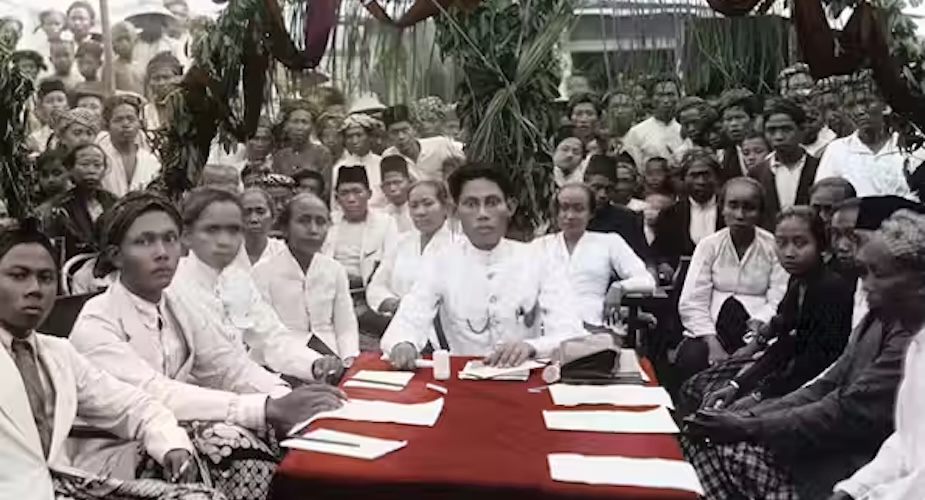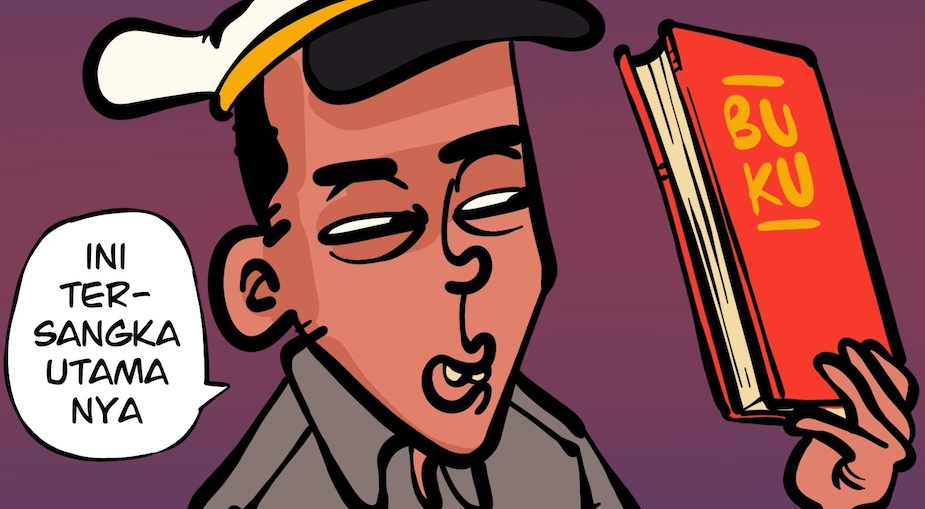Indonesia’s national image excludes many, in clear contradiction with its laws and principles
Versi Bh. Indonesia
Jeanna Nilsson & Kei Nilsson
Despite its motto of unity in diversity, queer folk are not part of Indonesia’s national image. Below, two authors share their experiences of queer Indonesia. First, Jeanna, who was born and raised in Sweden, writes of impressions of queer Indonesia from the outside. Then, Jeanna’s wife, Kei, born and raised in Indonesia but now residing in Sweden, writes about queer Indonesia from the inside.
From the outside in
Unity in diversity. Such words spark pride and patriotism in people, especially as those words are printed on a scroll held by the talons of the majestic Garuda. Such a motto suggests that everyone in Indonesia is treasured for their own uniqueness. But, in many ways, this motto is only mere words; many people are excluded from Indonesia’s national image.
LGBT people are excluded from national belonging in Indonesia. Authorities in places such as Aceh and Jakarta have declared LGBT people as a threat to the nation and named them solely responsible for spreading HIV. Aceh even has laws forbidding people from engaging in same-sex acts – acts which are punishable by caning. There have also been many other acts of discrimination against the LGBT community, including police raids in locations where gay men congregate and the public shaming of waria (trans women) during which police and vigilantes shaved their heads. Waria have also been hosed down with fire hoses and forced to undergo ‘cleansing’ rituals. Such acts serve two purposes: they punish LGBT Indonesians and encourage broader society to treat them as worthless beings.
This discrimination is not new, but it has become rampant in the last few years led by both state institutions and vigilante groups. There are now few safe places for LGBT Indonesians to congregate. This harassment hampers the work of human rights organisations trying to reach out to vulnerable groups. The message is loud and clear, LGBT people are not welcome in Indonesia. Indeed, hard-line Muslim cleric Ma’ruf Amin, who has been chairperson of the council Majelis Ulema Indonesia (MUI, Indonesian Ulema Council) and now Vice President of Indonesia, has stated that Indonesia should issue a fatwa – in other words a death warrant – against people who engage in sexual intercourse with someone of the same sex.
Looking at Indonesia from Sweden, I see a nation where LGBT people do not belong. This is my impression as an outsider; my wife is the one who has lived through these hellish experiences.

From the inside out
I was born and raised in Indonesia and I am of Chinese descent. Growing up, I faced racism on a daily basis. My worst experience was witnessing and surviving the May 1998 riots, during which hundreds of Chinese girls and women were raped, and many Chinese women and men were killed. Being raised a Christian made my life full of fear as many churches were bombed in the area where I grew up. Being a woman was also tough. I was constantly told that the things I wanted to do when I grew up – be a heart surgeon, play drums – were activities for men, not women. Being identified as a Chinese Christian woman in Indonesia was, in sum, hard enough – furthermore to be identified as lesbian required enormous courage as well.
Growing up in Indonesia, there was no discussion of anything like a lesbian identity. But I do remember a teenage boy in my high school who talked and behaved in a feminine way. He was ridiculed and called ‘gay’. Meanwhile, I was popular at school and excelled academically and did not want to compromise all of that by acknowledging I was a lesbian. Moreover, I did not want to jeopardise myself by standing up for people like this boy. I knew I should have done something, but I was frightened and worried about what would happen to me if people knew I was lesbian. Indeed, the only word I knew then other than gay was waria (trans person). I never had the courage to explore my sexuality in Indonesia; I was trained by society to believe that a woman must marry a man. It was not until I was 27 years old and no longer in Indonesia that I could finally accept my sexuality. Indonesia completely rejected me; I am in love with a country that will never love me back.
The Indonesian Constitution says that every person shall have equal treatment before the law. It says that every person shall have the right to be free from torture and inhumane and degrading treatment. The Constitution also says that every person shall have the right to be free from discrimination. Indonesia says the nation is united in its diversity, but its LGBT community is not included. Without this unity, we are divided, and we will fall – bersatu kita teguh, bercerai kita runtuh.
Jeanna Nilsson (isl12jni@student.lu.se) holds a Master’s degree in Asian Studies. Kei Nilsson (yu0176bu-s@student.lu.se) holds a Bachelor’s degree in Medicine and a Master’s degree in Medical Anthropology.















